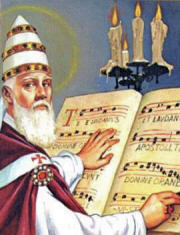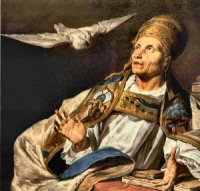Ordinary Time: September 3rd
Memorial of St. Gregory the Great, pope and doctor
Old Calendar: St. Pius X, Pope ; Other Titles: Gregory I; Gregory Dialogos; Father of the Fathers
St. Gregory, senator and prefect of Rome, then in succession monk, cardinal and pope, governed the Church from 590 to 604. England owes her conversion to him. At a period when the invasion of the barbarians created a new situation in Europe, he played a considerable part in the transitional stage, during which a great number of them were won for Christ. At the same time he watched over the holiness of the clergy and preserved ecclesiastical discipline, as well as attending to the temporal interests of his people of Rome and the spiritual interests of the whole of Christendom. To him the liturgy owes several of its finest prayers, and the name "Gregorian chant" recalls this great Pope's work in the development of the Church's chant. His commentaries on Holy Scripture exercised a considerable influence on Christian thought, particularly in the Middle Ages. Together with St. Ambrose, St. Augustine and St. Jerome, he is one of the four great Doctors of the Latin Church.
According to the 1962 Missal of St. John XXIII Extraordinary Form of the Roman Rite, today is feast of St. Pius X; his feast in the Ordinary Form of the Roman Rite is August 21. The feast of St. Gregory the Great in the Extraordinary Rite is March 12.
St. Gregory the Great St. Gregory was born at Rome in 540. He was successively senator and prefect of Rome before the age of 30. After five years he resigned and became a monk, transforming his own house into a Benedictine monastery, and founding six others. At the age of 50 he was elected pope, serving from 590 to 604. In 14 years he accomplished much for the Mystical Body of Christ.
St. Gregory was born at Rome in 540. He was successively senator and prefect of Rome before the age of 30. After five years he resigned and became a monk, transforming his own house into a Benedictine monastery, and founding six others. At the age of 50 he was elected pope, serving from 590 to 604. In 14 years he accomplished much for the Mystical Body of Christ.
After seeing English children being sold as slaves in Rome, he sent 40 monks, including St. Augustine of Canterbury, from his own monastery to make "the Angles angels." England owes her conversion to him. At a period when the invasion of the barbarian Lombards created a new situation in Europe, he played a great part in winning them for Christ. When Rome itself was under attack, he personally went to interview the Lombard King.
At the same time he watched equally over the holiness of the clergy and the maintenance of Church discipline, the temporal interests of his people of Rome and the spiritual interests of all Christendom. He removed unworthy priests from office, forbade taking money for many services, and emptied the papal treasury to ransom prisoners of the Lombards and to care for persecuted Jews and victims of plague and famine. These deeds and others made him, in the words of an antiphon in his office, "the Father of the City, the joy of the World."
Gregory reformed the liturgy, and it still contains several of his most beautiful prayers. The name "Gregorian chant" recalls this great Pope's work in the development of the Church's music. His commentaries on Holy Scripture exercised a considerable influence on Christian thought in the Middle Ages. St. Gregory died on March 12, 604. His body lies at St. Peter's in Rome.
Patron: choir boys; educators; gout; masons; music; musicians; choirs; singers; stonecutters; teachers; popes; students; scholars; against plague; against gout; against fever; England; West Indies;
Symbols: dove (the Holy Spirit perched upon St. Gregory's shoulder while he wrote); bishop's staff; book and a pen; papal tiara; a church; a sheet of music written in Gregorian style (4 lines, with square notes); scroll with the words, "Ora pro nobis Deum"; desk and book; altar; double or triple cross; eagle; lectern; tall cross and book.
Things to Do:
- Read this article about Gregorian chant.
- Play recordings of chant.
- You may find the entire collection of St. Gregory's writings in the Catholic Culture Library.
- From the Catholic Culture Library: Study the history of missionaries in England, The Origins of the Hymns of the Liturgy, Papal Errors in the Ordinary Magisterium? and Pope Pius X's encyclical, Iucunda Sane on Pope Gregory the Great.
- Read The Life of St. Gregory from the Golden Legend.
